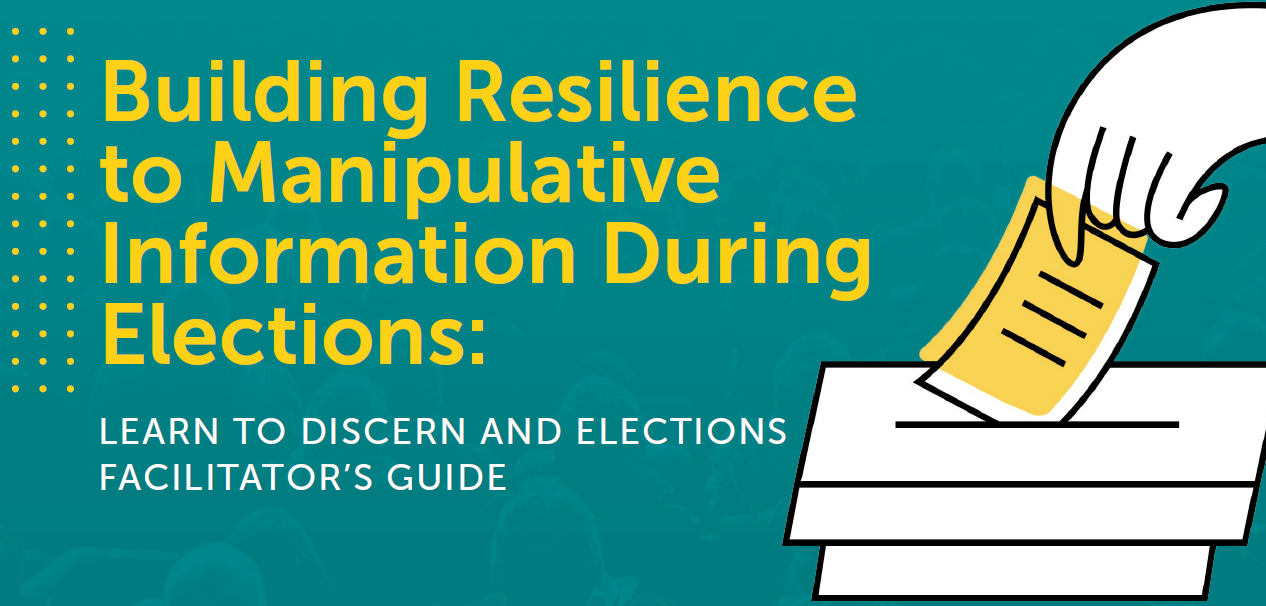Building Resilience to Manipulative Information During Elections: Learn to Discern and Elections Facilitator’s Guide

Elections play a vital role in maintaining democratic governance. They enable citizens to choose their leaders and hold them accountable for their actions and policies. Through the electoral process, voters have the opportunity to influence governmental decisions, ensuring that leaders represent the public's interests and concerns. Moreover, elections foster political stability and legitimacy, as elected officials gain their mandate from the will of the people.
The effectiveness of elections in promoting democracy depends heavily on the integrity of the information environment. Manipulative information can distort public perception, undermine trust in democratic institutions, and polarize communities. Therefore, it is essential for citizens to be equipped with the skills to critically engage with media and information and to recognize and resist manipulative information throughout the electoral cycle.
As part of this work, IREX has developed the Building Resilience to Manipulative Information During Elections: IREX Learn to Discern and Elections Facilitator’s Guide, based on IREX’s Learn to Discern (L2D) approach and training materials, with the goal of building resilience to manipulative information before, during, and after elections, through practical lessons, activities, and resources to support interventions for a variety of audiences in countries worldwide.
Purpose and Scope of the Resource
The Learn to Discern and Elections Facilitator’s Guide and supporting resources serve as a comprehensive resource for educators and trainers dedicated to developing critical thinking and resilience to manipulative information among voters, elections officials and observers, media professionals, and other citizen audiences.
This guide is structured to provide practical lessons, activities, and resources that cover the entire electoral cycle, from pre-electoral to post-electoral periods. It addresses the evolving information landscape, the role of media in elections, cognitive biases, and the strategies to recognize and resist manipulative information. The guide is adaptable for various contexts and is designed for in-person, online, or blended learning environments.
Building Resilience Before, During, and After Elections
Building resilience to manipulative information is a continuous process that spans the entire electoral cycle. This approach is guided by several core competencies:
- Understanding Cognitive Processes: Developing awareness of one's cognitive biases and emotional reactions to elections-related information.
- Navigating the Information Space: Gaining knowledge about the infrastructure of the complex information space, including algorithms and business models that influence media content.
- Maintaining Balance: Learning to safeguard attention, decision-making, and personal information in an overwhelming information environment, particularly during the electoral cycle.
- Practical Engagement Tools: Acquiring specific skills and tools to engage with elections-related information critically and responsibly.
- Constructive Interaction: Promoting prosocial behaviors and respectful engagement with others in the information space.
By fostering these competencies, the Learn to Discern and Elections Facilitator’s Guide aims to create a healthy, strong, and vibrant media and information environment that supports democratic processes. This, in turn, helps to prevent polarization, enhance voter decision-making, reduce conflict and radicalization, and preserve the integrity of elections.
Related
Addressing Gendered Manipulative Information
SAFE Basic Training Curriculum for Media Practitioners and Social Communicators